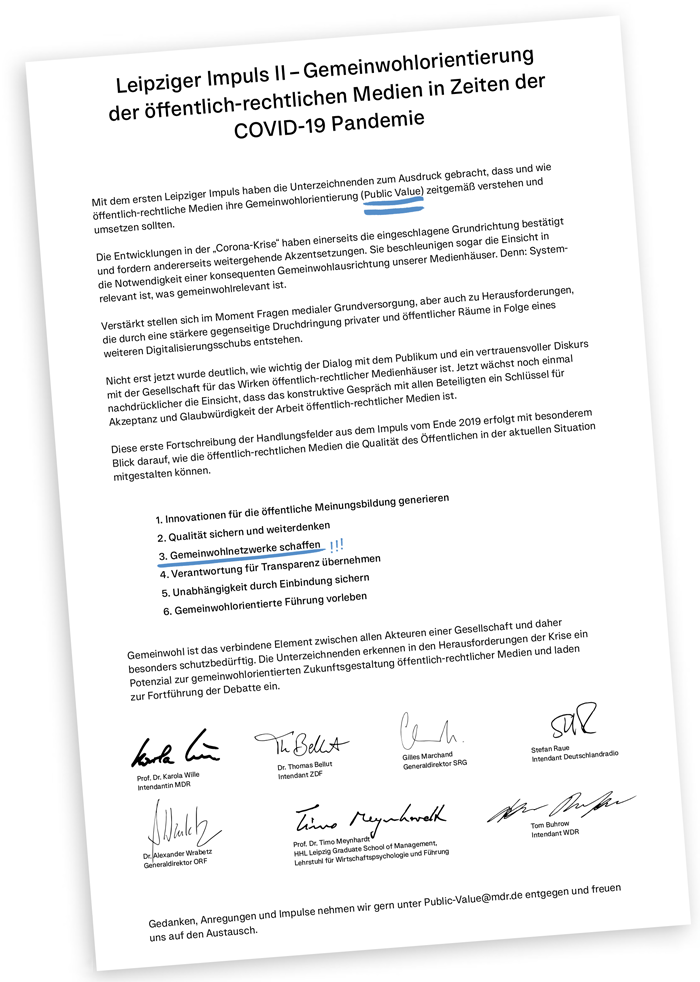Back to overview
Josef Estermann, sociologist of law Vicesse
#87 What applies in Switzerland to digitization and public service media?
Television and radio are and always have been "new media" based on the electronic transmission of information for the purposes of knowledge transfer, education and entertainment. Television programs are increasingly consumed in a non-linear fashion and can be accessed interactively. Their content is disproportionately shared on social media. As with all media, quality and value for the public depends on the conditions of production: Does a medium have to generate profit for entrepreneurs or is it supported by the community as a cultural achievement? The second opinion seems to have a majority here: in Austria and Switzerland, referenda have shown the willingness of citizens to pay fees for this service, although "taxes" are not too popular here and there. Although state control of public media was used for ruthless propaganda, especially in the last century, a structure of democratic control was able to establish itself after 1945, which

prevents information quality and crude propaganda and makes use of the possibility of "audience councils" and consultative bodies. The idea takes root that this is "our" media, the quality of which is necessary for the good existence of society. In Austria, as in Switzerland, which is highly differentiated regionally, culturally and linguistically - these differentiations form the basis of the state there in the first place - sufficient consideration of minorities is only possible through publicly financed media. There is no pecuniary profitability for media owners under these differentiation requirements, so they would have to place themselves in dependence on solvent, interested circles not subject to the democratic procedure. There are always politicians who would like to buy a medium in order to create sentiment for their cause. Digitization in the sense of broad-based interactive communication via media content is an opportunity that we should seize and pursue.
About the Admeira study "Media of the Future 2022".
The study shows that linear consumption of television and radio is declining, especially among younger media users, in favor of streaming services and social media (with platforms such as Facebook, Twitter, Instagram, Reddit, etc.). This applies equally to paid and free services. Advertising interruptions seem so inconvenient that not too high a cost is gladly accepted for undisturbed consumption.
The perception of content is differentiated not only by media (print, moving image, imageless sound), but above all by its moderation. Social media users are well aware that content producers follow personal interests and are subject to the demands of funders. Quality of content is thus dependent on professionalism (control of personal interests) and funding (penetration of advertising and private and state powers on content, payment of media creators). It is thanks to the outgoing U.S. administration that the term "fake news" has had such a stellar career. "Fake" or "real" is in fact decided by the type of production and the reliability of the producers. It is desirable for both to be the subject of democratically moderated, transparent discourse, which is what the public media are best able to guarantee.



 prevents information quality and crude propaganda and makes use of the possibility of "audience councils" and consultative bodies. The idea takes root that this is "our" media, the quality of which is necessary for the good existence of society. In Austria, as in Switzerland, which is highly differentiated regionally, culturally and linguistically - these differentiations form the basis of the state there in the first place - sufficient consideration of minorities is only possible through publicly financed media. There is no pecuniary profitability for media owners under these differentiation requirements, so they would have to place themselves in dependence on solvent, interested circles not subject to the democratic procedure. There are always politicians who would like to buy a medium in order to create sentiment for their cause. Digitization in the sense of broad-based interactive communication via media content is an opportunity that we should seize and pursue.
prevents information quality and crude propaganda and makes use of the possibility of "audience councils" and consultative bodies. The idea takes root that this is "our" media, the quality of which is necessary for the good existence of society. In Austria, as in Switzerland, which is highly differentiated regionally, culturally and linguistically - these differentiations form the basis of the state there in the first place - sufficient consideration of minorities is only possible through publicly financed media. There is no pecuniary profitability for media owners under these differentiation requirements, so they would have to place themselves in dependence on solvent, interested circles not subject to the democratic procedure. There are always politicians who would like to buy a medium in order to create sentiment for their cause. Digitization in the sense of broad-based interactive communication via media content is an opportunity that we should seize and pursue.